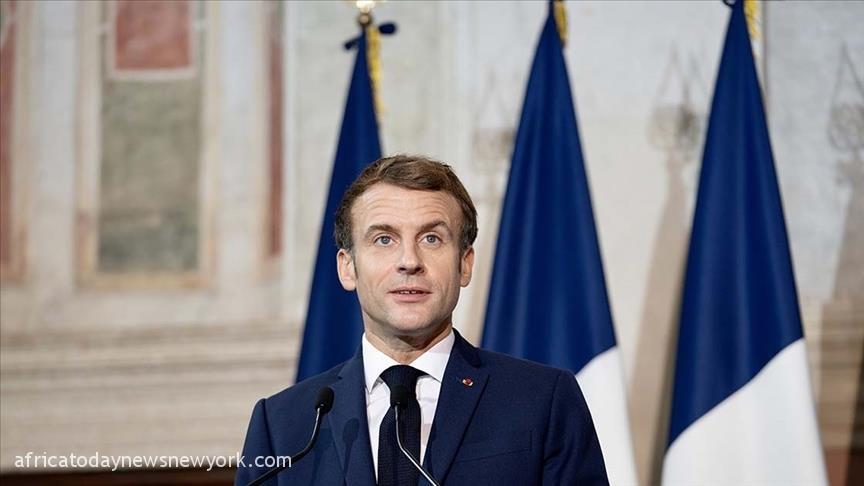French President Emmanuel Macron easily beat far-right competitor Marine Le Pen on Sunday, gaining a second term and averting a political earthquake.
Read Also: With Election In Focus, Macron Begins ‘Tour De France’
Cheers of excitement erupted as the results were shown on a huge screen at the Champ de Mars park near the Eiffel Tower, where Macron supporters waved French and EU flags. Individuals embraced one another and yelled “Macron.”
Le Pen conceded loss but pledged to continue fighting in the run-up to the June legislative elections.
“I will never abandon France,” she reassured her supporters.
Macron was projected to win between 57 and 58 percent of the vote in the first pollster forecasts. These predictions are often accurate, but may be fine-tuned throughout the evening as official results come in from throughout the nation.
Macron, on the other hand, can anticipate little to no grace period after many voters, particularly on the left, voted for him grudgingly in order to prevent the far-right from winning. Protests that plagued a portion of his first term might explode again rather fast if he pushes pro-business measures through.
“We will not spoil the victory, but National Rally has its highest score ever,” Health Minister Olivier Veran said on BFM TV.
“There will be continuity in government policy because the president has been reelected. But we have also heard the French people’s message,” he continued.
The first significant obstacle will be the June legislative elections, when opposition groups on both the left and right will launch a big campaign to elect a parliament and government hostile to Macron.
Philippe Lagrue, 63, a technical director at a Paris theatre, revealed earlier in the day that he voted for Macron after initially voting for hard-left candidate Jean-Luc Melenchon.
He said that he will vote for Melenchon once again in June, “Melenchon Prime Minister. That would be fun. Macron would be upset, but that’s the point.”
According to pollsters Ifop, Elabe, OpinionWay, and Ipsos, Macron would win by a margin of 57.6 to 58.2 percent.
Victory for the pro-European, centrist Union Macron was quickly hailed as a savior for mainstream politics, which has been shaken in recent years by the UK’s withdrawal from the European Union, Donald Trump’s election victory in 2016, and the emergence of a new generation of nationalist politicians.
“Bravo Emmanuel,” European Council President Charles Michel tweeted. “In this turbulent period, we need a solid Europe and a France totally committed to a more sovereign and more strategic European Union.”
Macron will join an exclusive group – just two previous French presidents secured a second term. However, his margin of victory seems to be narrower than it was when he defeated Le Pen for the first time in 2017, highlighting how many French remain unsatisfied with him and his domestic record.
This disillusionment was mirrored in turnout numbers, with France’s leading polling institutions predicting an abstention percentage of roughly 28%, the highest level since 1969.
With Russia’s invasion of Ukraine and the accompanying Western sanctions exacerbating a spike in petrol prices, Le Pen’s campaign hammered Macron on the growing cost of living.
She pledged steep reductions in gasoline taxes, a 0% sales tax on basic commodities ranging from pasta to diapers, income exemptions for young employees, and a “French first” approach to employment and welfare.
Meanwhile, Macron cited her prior fondness for Russia’s Vladimir Putin as evidence that she could not be trusted on the international stage, while saying she had intentions to withdraw France from the European Union – a claim she disputes.
Macron downplayed his previous vow to make the French work longer in the later stages of the campaign, saying he was open to dialogue on proposals to increase the retirement age from 62 to 65.
In the end, as viewer polls conducted during last week’s acrimonious televised discussion between the two shown, Le Pen’s ideas – which included a plan to prohibit Muslims from wearing headscarves in public – proved too harsh for the majority of French.
Macron’s choice to compete for the president in 2017 and build his own grass-roots organization from scratch upended long-held assumptions about French politics – a decision that may come back to haunt him in June’s legislative elections.
Brown Stone contributed reporting, and MarkAnthony Nze, Ph.D. edited the piece for Africa Today News, New York.

